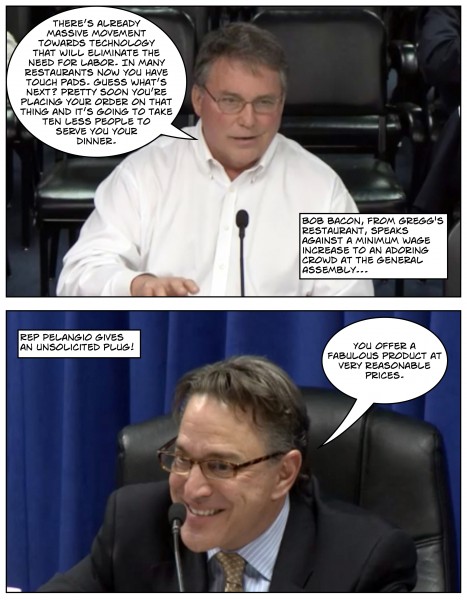
At recent State House hearings on raising the minimum wage and eliminating the tipped minimum wage, restaurant owners, beginning with Bob Bacon of Gregg’s Restaurants, (who is also the president of RIHA, the Rhode Island Hospitality Association) have repeatedly brought up the specter of automation replacing low wage workers if labor costs are raised. Raising the wage, say entrepreneurs, will price minimum wage workers out of the market, and these robots are being developed now.
Following this argument to its inevitable conclusion, workers should realize that unless they are prepared to always sell their labor at rates below the price of a robot, they will be unemployable. As the price of such technology falls, workers should expect to have their wages slashed accordingly. It’s not just workers in restaurants who will be replaced, but taxi cab drivers, long haul truckers and soldiers. According to NBC News, even skilled workers like pharmacists and supposedly skilled workers like writers may find themselves displaced. In fact, one study estimates that 47% of jobs are at risk of being lost to robots.
I suppose that in the face of this threat we could fight for our jobs, selling our labor ever cheaper, exhausting ourselves in John Henry-like feats of frenzied work that demonstrate our indefatigable spirit even as our hearts explode in glorious exertion…
Or we can flip the script.
Whenever a new robot is developed, the owner simply lays off a bunch of workers, presses the “on” button and relaxes as the profits roll in. This allows the entrepreneur to enjoy a steady stream of income as the unemployed workers struggle to survive.
As more and more robots come online, less and less people will be employed. Eventually, even skilled robot mechanics will lose their jobs as robots will be able to repair each other. The humans of this world will be divided into those who own the robots and those who are starving to death. I think this is what Paul Krugman meant by “uncomfortable implications” when he discussed the future of robotics.
The problem with this scenario should be obvious. As this transition to the robo-centric world of tomorrow develops, there will be less and less people able to afford to buy the many things the robots are making. Long before we get to the point where the 1% of the 1% own the entire world and an army of robots to do their bidding, the economy will have collapsed.
No one will be able to afford to eat at Gregg’s.
So what’s the answer? Robert Reich suggests that it “may be that a redistribution of income and wealth from the rich owners of breakthrough technologies to the rest of us becomes the only means of making the future economy work.”
We already subsidize the restaurant industry with our taxes. Mike Araujo of ROC United RI says that “tipped workers in Rhode Island currently receive $638,325 in food stamps every month.” That’s because the wages the restaurants pay to these workers are too low, and as more workers are replaced by robots and become unemployed, we’ll need to expand our social safety net. To do that we’ll have to tax the owners of the robots.
In light of this logic, our best bet is to get on with this now. We need a progressive income tax structure to increase taxes on the top earners in our state. We need to strengthen and increase, not eliminate, the estate tax. We need to tax capital gains and we need a transaction tax on all stock trades. I’m sure there’s a lot more good tax policy ideas I’m missing, but for the problem of robots and automation in particular, we need a robot tax.
In the future predicted by the leaders of the Rhode Island Hospitality Association, there will be fewer and fewer people able to pay taxes or in any way participate in the economic system of our state. Robots, however, will be productive and very taxable. Instead of allowing a system where workers strive ever harder for less, we need to impose an automation tax on industries that replace workers with robots.







